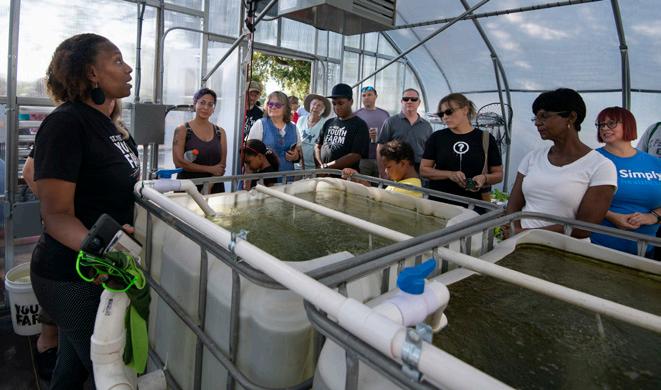
8 minute read
ADVANCING SUSTAINABILITY
ADVANCING CAMPUS SUSTAINABILITY
Matthew Cimitile
Advertisement
For some, sustainability means creating a healthier environment through practices and choices that result in greater resiliency and cleaner air and water. For others, sustainability is tied closely to social equity, finding ways to better distribute resources and policy outcomes that create equal access to opportunities. And for others, it has a largely economic component of developing new ways of doing business that result in sustainable operations and long-term savings.
Over the past year, the USF St. Petersburg campus has made advancements on all these fronts of sustainability, doing its part to address climate change, enhance access to resources, reduce waste, improve the bottom line and more.
FRESH & LOCAL GREENHOUSE FIGHTS FOOD INSECURITY
The USF St. Petersburg campus and the St. Pete Youth Farm unveiled the Fresh & Local Greenhouse, which provides fresh vegetables and fish to the community while giving students the opportunity to learn about sustainable farming methods. The new greenhouse enhances urban agriculture and helps address food inequality in south St. Petersburg, where access to affordable and nutritious food is limited. The structure allows for both hydroponics and aquaponics farming and helps college and high school students grow their knowledge of food production while building business skills.
“Through this greenhouse project, I am hopeful we will be able to advance the practical learning of sustainable food production, especially in urban settings. It will also provide easy access to affordable fresh and local vegetables to our community, promote creativity among our youth and attract supportive partnerships from various organizations and businesses within the county and beyond,” said Winnie Mulamba, who served as sustainability planner at USF’s St. Petersburg campus.
Located in the most densely populated county in the state, St. Petersburg has a limited amount of land available for food production and a higher percentage of people who identify as food insecure than the national average. More than 190,000 people in Pinellas County are food insecure, according to the nonprofit organization Feeding Tampa Bay.
The greenhouse is growing a variety of lettuces and peppers. Tomatoes and herbs will be added. All will complement the many fruits and vegetables that are grown outside at the youth farm. Blue and red tilapia are also being farm raised within the greenhouse, with their waste being used as fertilizer to grow some of the vegetables within.
Besides providing food, this urban agriculture initiative will teach students about various farming techniques and entrepreneurship. A majority of the produce will be sold through a youth-driven social enterprise led by the St. Pete Youth Farm and USF’s St. Petersburg campus, with proceeds going back to support the greenhouse and farm. The remaining produce will be given to local charity centers.
“We thought we were setup to just provide food but it is way more than that. We are cultivating young people and cultivating food at the same time,” said Carla Bristol, collaboration manager at the St. Pete Youth Farm. “And this greenhouse will allow us to grow year-round, grow in a pestfree environment and teach young people about the variety of ways, and technology used, to grow for greater breadth of knowledge and opportunity.”
The Fresh & Local Greenhouse was made possible by a $25,000 grant from the Ford Motor Company Fund in 2020. USF’s St. Petersburg campus was one of only seven higher education institutions across the nation to receive a grant through the Ford College Community Challenge that year. Additional funding from USF St. Petersburg campus alumni and internal grants supported the greenhouse and the hydroponics and aquaponics system within.
“The Ford Fund is very proud to have been able to support the Fresh & Local Greenhouse project through the Ford College Community Challenge grant. The opening of the greenhouse is a true testament to the hard work of the students and the local community,” said Mike Schmidt, director of economic mobility and global community development at the Ford Motor Company Fund.

CONNECTING TO CLEAN ENERGY THROUGH COMMUNITY SOLAR
A new community solar program from Duke Energy is allowing the campus to expand its investment in renewable energy while saving money and enhancing environmental sustainability.
Clean Energy Connection allows Florida businesses and residents to receive the environmental and long-term cost benefits of solar energy without having to install and maintain costly equipment. By becoming a subscriber in the program, the campus will expand its renewable energy portfolio – by up to 6,753 kilowatts - and support Duke Energy’s reduction of greenhouse gas emissions at a fraction of the cost of adding more solar panels and arrays.
“It is an appealing program because our campus is in a location where land is very expensive and we don’t have much space to expand and offset a significant amount of our energy demand with onsite renewable energy infrastructure,” Mulamba said, who served as sustainability planner at the USF St. Petersburg campus. “These limitations make the Clean Energy Connection program a great solution for those barriers.”
The program works by allowing businesses and residents to subscribe by paying a monthly subscription rate. The subscription is used to support solar energy generation by developing and maintaining Duke Energy’s solar portfolio, including ten 74.9-megawatt solar plants across Florida. The solar plants produce clean, renewable energy that will be added to the electric grid. While supporting clean energy, those enrolled will earn renewable energy and bill credits based on subscription size, which reduce cost over time and act as a renewable energy credit to offset electric needs.
“Supporting clean, renewable energy is important to our customers and communities, however, we recognize not everyone has the space or funds to add solar panels to their home or business,” said Melissa Seixas, Duke Energy Florida state president, who also serves as chair of the USF St. Petersburg Campus Advisory Board and a member of the USF Board of Trustees. “The Clean Energy Connection program helps customers and businesses like USF achieve their sustainability goals, earn savings on utility costs and be a part of a community that supports the transition to a cleaner energy future.”
The campus will receive credit for more than 6,750 kilowatts of renewable power through the community solar program, which amounts to nearly 70 percent of total energy demand, based on 2019 data. The campus will achieve this figure by 2024, when all ten megawatt solar plants come online.
Though there is a subscription cost for this large quantity of renewable energy, the bill credits will start to accumulate quickly and reduce overall cost. By year six, the credits will be larger than the subscription cost each month, creating savings for the campus. By year seven, the campus will reach its payback period, meaning total bill credits earned will equal the total cost of investment. “This program is a great opportunity as it supports both environmental and financial sustainability for the university. By participating with other members of the community, we can make an impact on our environment that also delivers significant net cost savings as a financial return on investment,” said David Everingham, regional vice chancellor for administration & finance at the USF St. Petersburg campus.

REVERSE RECYCLING DEBUTS AT USF
Six new machines on USF’s campuses resemble vending machines, but instead of money, they accept plastic bottles and aluminum cans.
The reverse vending machines (RVM) are funded by Coca-Cola as part of its “World Without Waste” environmental program, which includes an ambitious goal of collecting and recycling every bottle or can it sells by 2030. To assist in these efforts, Coca-Cola has agreed to donate five cents per aluminum can or plastic bottle collected at USF to the Feed-A-Bull Food Pantry up to $5,000 per year. Through a survey created by Student Government, students selected Feed-A-Bull Food Pantry as their philanthropy of choice as it provides emergency food assistance and resources to students in need.
“I think this will provide a positive impact to combat food insecurity for our USF community,” Student Body Vice President Jillian Wilson said.
Even though the machines are managed by Coca-Cola, they will accept empty aluminum cans and plastic bottles from any brand. They’re not required to be cleaned, but the RVM will spit out anything that doesn’t meet recycling criteria, such as a glass bottle. The materials are crushed and sorted by type, collected by Coca-Cola’s subcontractor, Atlas, then treated and prepared for reuse.
The maximum capacity for each machine is approximately 900 crushed containers. The performance of each RVM will be monitored monthly to make sure that collectively, they’re on track to reach the maximum donation amount for the pantry.
“We are very excited with the launch of the RVM project and hope students embrace this program and help support this great cause,” USF Auxiliary Services Director Nancy Santiago said.
For future semesters, the addition of card readers is being considered to run student competitions and further incentivize recycling on campus. Strategically placed in high-demand or high-traffic areas, two machines were installed on the St. Petersburg campus and four on the Tampa campus.










